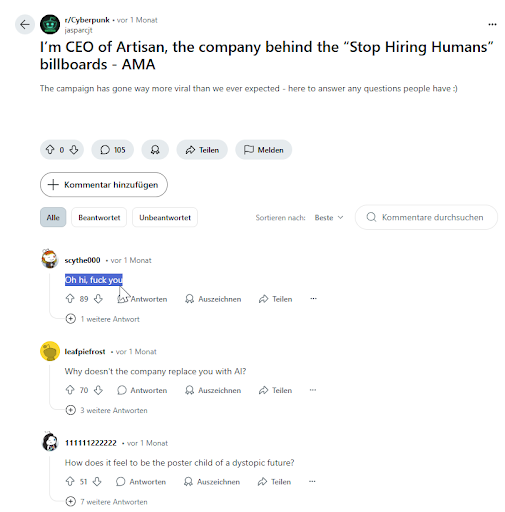The “Stop Hiring Humans” campaign
The provocative "Stop Hiring Humans" campaign is currently generating a lot of discussion – it plays on fears and raises important questions. Of course, the campaign's message is nonsense in and of itself: It is currently not possible to completely replace humans with so-called AI bots. Nevertheless, the underlying concerns of many people are real and deserve attention.
The company behind this campaign has itself stated that it is a marketing stunt designed to generate attention. The strategy of provoking debate through so-called "rage bait" content is clearly working: Even in Brandenburg, a US company is being discussed. But behind the PR campaign lies a serious issue that affects us all – the automation and digitalization of the world of work.
As early as 2013, a widely cited study by Frey and Osborne showed that up to 47% of jobs in the USA could potentially be replaced by increasing computerization. In Germany, with its greater industrialization, the number could be as high as 50%. However, it has since become clear that entire professions are rarely completely replaced. Rather, specific tasks are automated, while others must continue to be performed by humans. A vivid example is the truck driver: While driving on the highway could be automated, the handover at the destination, unloading, and possible interaction with traffic police remain human tasks. This is why, at least for now, the entire job of the truck driver cannot be rationalized away.
Another important aspect: The "irony of automation," first described by Lisanne Bainbridge in the 1980s, states that increased automation also creates new challenges. Automated systems require human monitoring and further development. Furthermore, there is a risk of expertise being lost if people rely too heavily on machines. For example, those who only drive cars with automatic transmissions will forget how to drive with manual transmissions—and this can be applied to many areas.
I, Simon Wilbers, have also researched this topic and have recognized not only the challenges but also the positive aspects that the use of generative AI can bring. In my study (Wilbers, S., Gröpler, J., Prell, B., Reiff-Stephan, J. (2024), I demonstrated how generative AI can empower people to work more creatively and effectively in teams. Generative AI is perceived as a "good partner" in the writing process.
If you would like to learn how you can leverage digitalization and automation with generative AI in a human-centered and effective way, contact Notivo. We empower your employees to optimally utilize AI agents without replacing them. The knowledge base created and continuously maintained with Notivo allows you to retain control over generative AI and automation processes. Our approach is based on closely supporting your employees through targeted training and coaching. We actively support your company in the paradigm shift from a traditional IT culture to a dynamic knowledge culture characterized by generative AI and modern knowledge management.
Alternatively, you could hurl insults at the founder of the startup responsible for the campaign on Reddit; here, he answers questions and addresses the users' comments, mostly insults. If you want to use your time productively, contact us at Notivo. We are ready to help you use generative AI for the lasting benefit of your company and your employees. Together, we will create solutions that allow you to efficiently utilize the advantages of automation while always keeping the human element in mind.
Sources
Frey, CB, & Osborne, MA (2017). The future of employment: How susceptible are jobs to computerization?. Technological forecasting and social change, 114, 254-280.
Bonin, H., Gregory, T., & Zierahn, U. (2015). Application of the Frey/Osborne (2013) study to Germany: Final report.
Bainbridge, L. (1983). Ironies of automation. In Analysis, design and evaluation of man–machine systems (pp. 129-135). Pergamum.
Wilbers, S., Gröpler, J., Prell, B., & Reiff-Stephan, J. (2024, March). Overall Writing Effectiveness: Exploring Students' Use of LLMs, Pushing the Limits of Automated Text Generation. In International Conference on Science and Technology Education (pp. 11-22). Cham: Springer Nature Switzerland.

